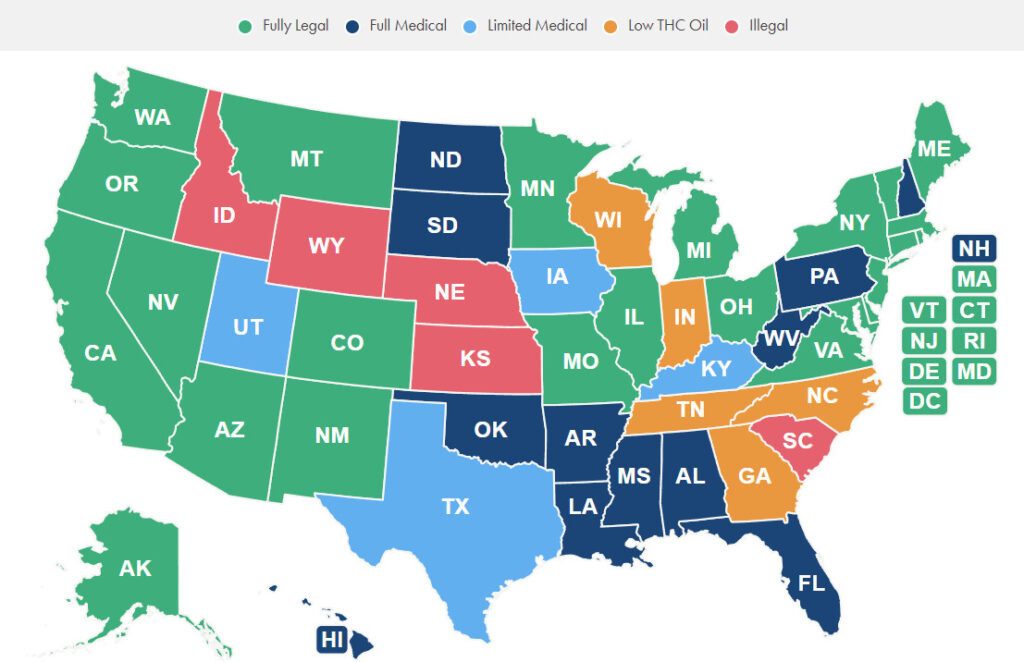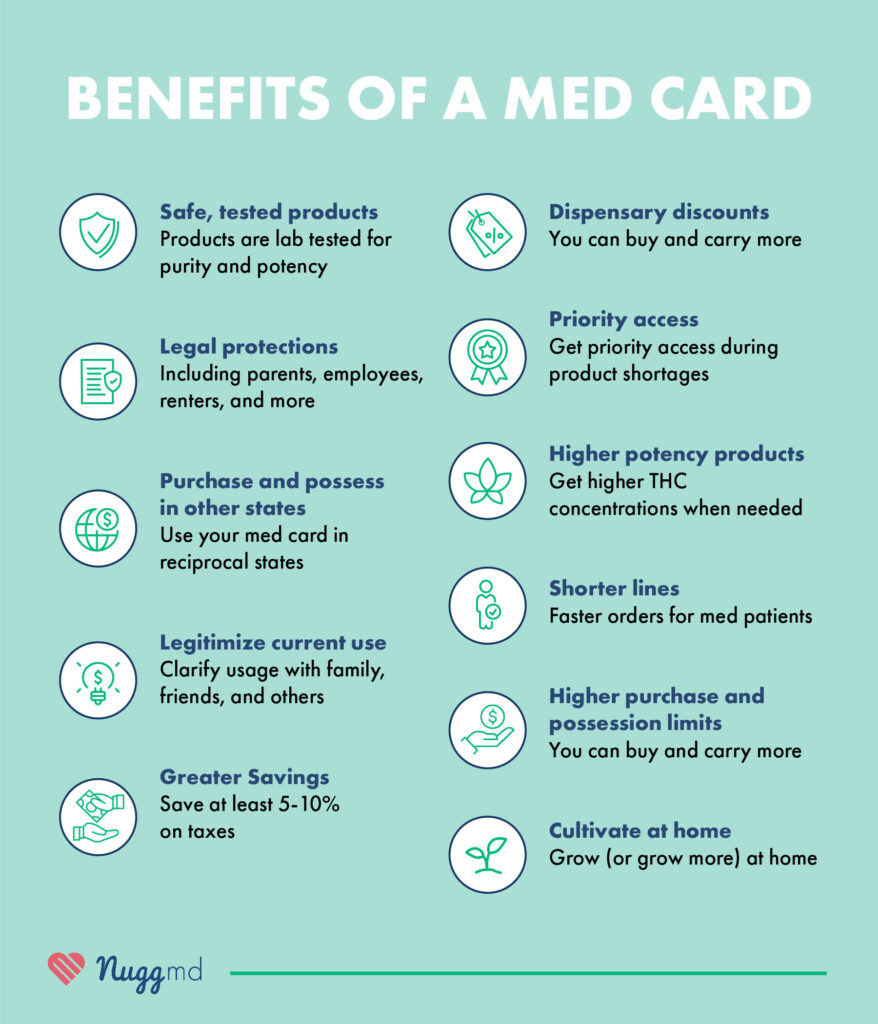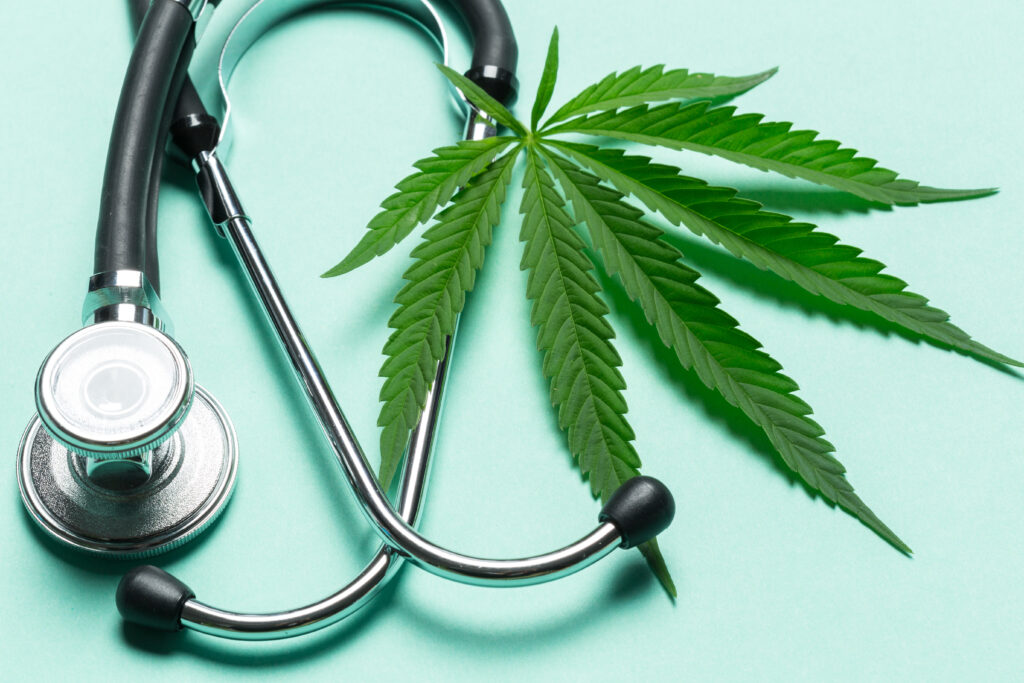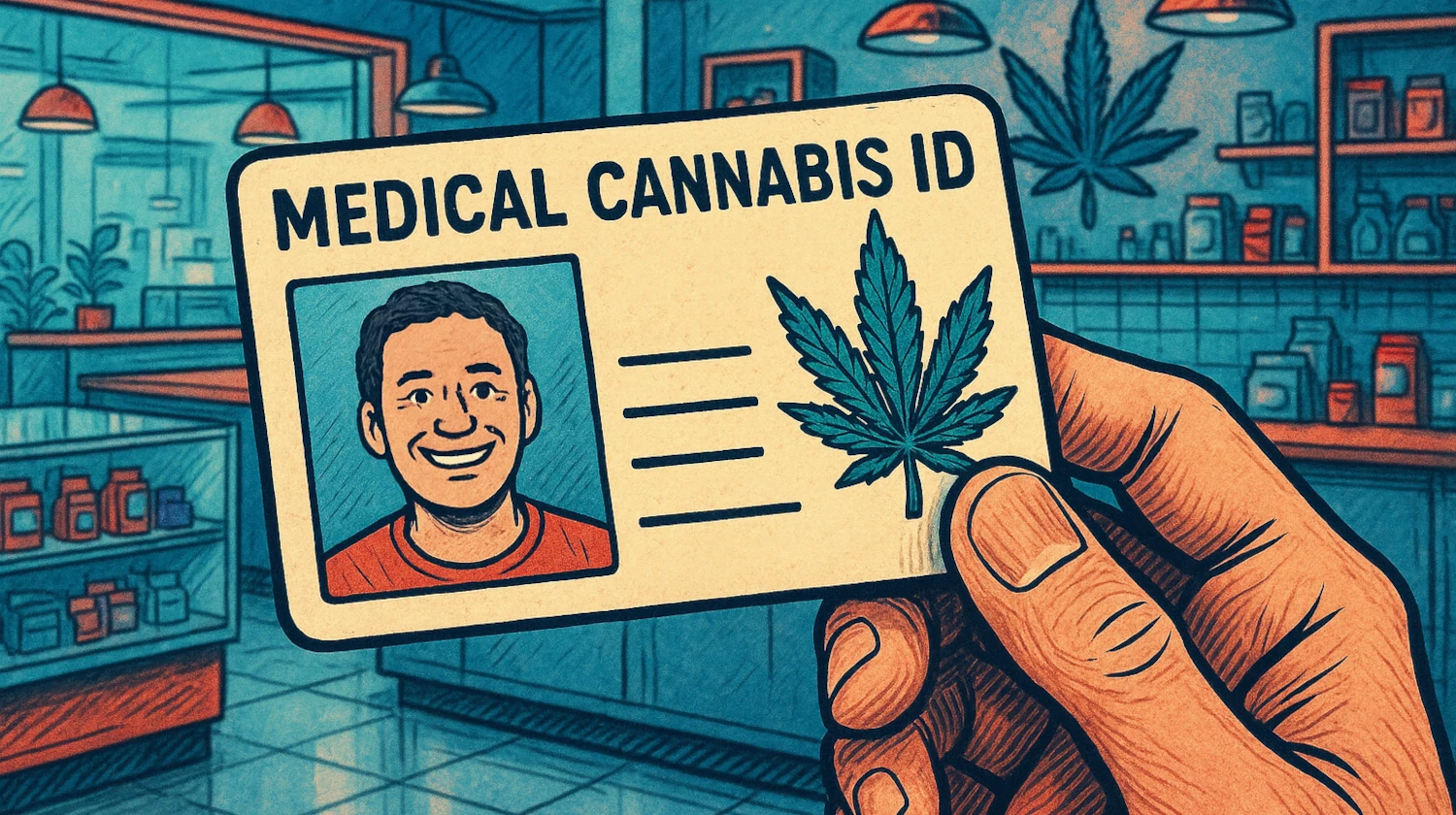In This Article
- Where are MMJ Cards Required?
- What are the Pros of Having a Medical Marijuana Card?
- Priority
- Legal protection
- Lower cost
- Higher potency
- Increased purchase limits
- Higher possession limits
- Increased growing limit
- Lower age restriction
- Reciprocity
- What Are The Consequences Of Getting A Medical Card?
- No firearms
- No commercial driver's license
- Not allowed for federal employees
- Annual renewal required
- Bureaucracy
- Conclusion
Even as adult use, or recreational, cannabis laws become more common, the medical market still plays an integral part for many reasons. Having a medical marijuana ID has primarily positive effects. Still, there can be consequences depending on the state.
What are the potential pros and cons for would-be med card holders? And how do cannabis laws vary in your state?
Where are MMJ Cards Required?
As of July 2024, 39 states and Washington, D.C. have comprehensive medical cannabis laws. Because of a lack of federal allowances, states have made their own rules. The result is a patchwork of laws and regulations, offering various levels of access.
Below is a list of current states with medical marijuana programs:

- Alabama
- Alaska
- Arizona
- Arkansas
- California
- Colorado
- Connecticut
- Delaware
- District of Columbia
- Florida
- Hawaii
- Illinois
- Iowa
- Kentucky
- Louisiana
- Maine
- Maryland
- Massachusetts
- Michigan
- Minnesota
- Mississippi
- Missouri
- Montana
- Nevada
- New Hampshire
- New Jersey
- New Mexico
- New York
- North Dakota
- Ohio
- Oklahoma
- Oregon
- Pennsylvania
- Rhode Island
- South Dakota
- Texas
- Utah
- Vermont
- Virginia
- Washington
- West Virginia
Additional states have allowed medical cannabis use but are often considered so restrictive on qualifying conditions, dosages and/or permitted products that these states are often not considered functioning medical marketplaces.
What are the Pros of Having a Medical Marijuana Card?

Priority
Certain states, like Illinois, grant priority cannabis access to their medical card holders. If the market ever faces a shortage, medical patients can jump to the front of the line at dispensaries. Lawmakers decided to ensure that patients received medicine even during critical supply times. That case occurred during the early days of the COVID-19 pandemic when dispensaries were kept open in many states after being considered essential businesses.
Legal protection
A medical cannabis card allows you to buy, possess, and consume cannabis legally. Be ready to verify your qualifications. Like a driver's license, you need your card to participate in the marketplace legally. If you fail to have your ID, you may face legal consequences depending on your state.
States like Florida can charge individuals with a second-degree misdemeanor for having cannabis without their med card. In Michigan, authorities can prosecute those found to be in possession of cannabis without their MMJ ID.
Lower cost
Legal cannabis can be expensive, especially in the recreational market. Adult use consumers are typically subject to two or three tiers of taxes applied on cannabis purchases. Depending on the state and its laws, markets can tax cannabis on quantities purchased, product type, THC potency, and other parameters. You can find a detailed state-by-state breakdown of cannabis taxes as of 2023.
Medical cannabis patients can avoid much of the tax burden, saving at least 5-10% (and as much as 35% in a few states) on every purchase. More specifically, several states exempt the medical market altogether from paying retail and excise taxes since your use is medical, not recreational. This makes it easy for many consumers to offset the cost of a medical card quickly.
Higher potency
Physicians can prescribe higher doses of cannabis to medical cardholders who demonstrate a need for a more substantial medicine.
If an adult-use consumer wants a substantial dose of cannabis, they'll likely need to buy more products, thus driving costs up. That isn't always the case with medical consumers, who often are granted higher purchasing allotments or can buy higher concentration products made for medical consumers. Depending on state law, these products may contain higher doses of THC per package and dose than can be found at recreational dispensaries.
Products like high-potency vape cartridges and edibles are more likely to contain higher doses for med patients, with potencies often hovering between 50% and 90%.
Increased purchase limits
In addition to higher potency products, many medical patients can typically buy larger quantities of cannabis compared to recreational buyers. With this rule, patients can stock up and ensure they have the medicine needed to address their medical condition(s).
For example, in Arizona, medical cannabis patients can buy up to 2.5 ounces at a time, while recreational consumers can only purchase an ounce. For those who don't like driving to and waiting in line at dispensaries, this saves a lot of gas and time.
Each state has different rules, so you'll want to understand what your state allows before buying. But in the worst-case scenario, your Budtender will know and can help you.
Higher possession limits
Medical patients are allowed to possess up to a 60-day supply of cannabis as defined by their physician. The amount of cannabis recommended is usually high enough so that patients are allowed to possess and store more cannabis than recreational consumers. However, this depends entirely upon the amount recommended in your certification. So, check your limits first and speak to your physician if the recommended amount isn't enough to meet your daily needs.
Never try to possess more than three ounces of flower at a time unless your certification specifically allows it. Consumers found in violation of their state’s possession limits may face steep criminal penalties.
In New York, an adult-use state, recreational users in possession of over 8 ounces are subject to a Class E felony charge. They face a jail sentence of up to four years and fines reaching $5000.
Here is a breakdown of state-by-state possession limits as of June 2022:
| Alabama | 70 daily dosages |
| Alaska | 1 oz |
| Arizona | 2.5 oz every 14 days |
| Arkansas | 2.5 oz every 14 days |
| California | 8 oz |
| Colorado | 2 oz |
| Connecticut | 2.5 oz |
| Delaware | 6 oz |
| District of Columbia | 2 oz dried |
| Florida | 35-day supply |
| Hawaii | 4 oz |
| Illinois | 2.5 oz every 14 days |
| Iowa | 4.5 grams (4500mg) THC every 90 days |
| Louisiana | 1-month supply, case-by-case amount determined |
| Maine | 2.5 oz |
| Maryland | 30-day supply, determined by physician |
| Massachusetts | 60-day supply/10 oz |
| Michigan | 2.5 oz |
| Minnesota | 30-day supply |
| Mississippi | 3.5 grams of cannabis per day, capped at six days a week/3 oz per month |
| Missouri | 4 oz dried flower per 30-day period |
| Montana | 1 oz |
| Nevada | 2.5 oz |
| New Hampshire | 2 oz every 10 days |
| New Jersey | 3 oz |
| New Mexico | 6 oz |
| New York | 60-day supply |
| North Dakota | 3 oz every 14 days |
| Ohio | 90-day supply, amount to be determined |
| Oklahoma | 3 oz |
| Oregon | 24 oz |
| Pennsylvania | 30-day supply |
| Rhode Island | 2.5 oz |
| South Dakota | 3 oz |
| Texas | Determined by physician |
| Utah | 113 grams (unprocessed cannabis) |
| Vermont | 2 oz |
| Virginia | 90 day supply of extracts and botanicals |
| Washington | 8 oz |
| West Virginia | 30-day supply, amount to be determined |
Learn more about cannabis sizes and prices and how long your purchase may last.
Increased growing limit
Several medical and adult-use states have adopted home cultivation laws. The measure allows people to grow their own cannabis. In many cases, medical patients are allowed to grow additional plants or seedlings. The move ensures consumers have access and likely saves patients some money in the process.
States to enact home grow laws include:
- Alaska
- Arizona
- California
- Colorado
- Hawaii (Medical-only)
- Illinois (Medical cultivation only, not recreational)
- Maine
- Maryland
- Massachusetts
- Michigan
- Missouri
- Montana
- Nevada
- New Mexico
- New York
- Oklahoma (Medical-only)
- Oregon
- Rhode Island
- South Dakota
- Vermont
- Virginia
- Washington (Medical-only)
Check your state laws before starting your home cannabis grow. And begin with our tips for how to dry and cure your home-grown flower.
Lower age restriction
In many states, minors can take part in the medical marijuana program with the consent of a parent or legal guardian.
The most commonly cited medical conditions for children include:
- Autism
- Cancer
- Cerebral Palsy
- Chronic or intractable pain, when opioids do not appear to work
- Epilepsy/Seizure disorders
- Extreme nausea & vomiting
- Extreme weight loss
- Sickle Cell-related diseases
- Other terminal illnesses
Minors taking part in the program are almost always required to register at least one MMJ caregiver on their behalf. Depending on the state, a caregiver can grow, buy, transport, and administer cannabis to the patient.
Reciprocity
Reciprocity is when one medical or adult use state accepts medical cards from other states – allowing visitors to receive their medicine while away from home. When traveling, medical patients may be able to access cannabis in the following states legally:
✔ Arizona
✔ Arkansas
✔ Delaware
✔ Hawaii
✔ Maine
✔ Maryland
✔ Michigan
✔ Nevada
✔ New Hampshire
✔ New Jersey
✔ New Mexico
✔ Oklahoma
✔ Rhode Island
✔ Utah
✔ West Virginia (For terminally ill patients only)
Washington, D.C. also offers reciprocity.
Another possibly perplexing component of reciprocity is the difference between buying and possessing. In some states, like Missouri, out-of-state patients can't buy cannabis but can legally possess it if they have their med card.
As of July 2024, this is how reciprocity laws look in the US:
| State | Possession reciprocity | Buying reciprocity |
| Alabama | No | No |
| Alaska | No | No |
| Arizona | Yes | No |
| Arkansas | Yes | Yes |
| California | No | No |
| Colorado | No | No |
| Connecticut | No | No |
| Delaware | No | No |
| District of Columbia | Yes | Yes |
| Florida | No | No |
| Guam | No | No |
| Hawaii | Yes | Yes |
| Illinois | No | No |
| Louisiana | Yes | Yes |
| Maine | Yes | Yes |
| Maryland | No | No |
| Massachusetts | No | No |
| Michigan | Yes | Yes |
| Minnesota | No | No |
| Missouri | Yes | No |
| Montana | Yes | No |
| Nevada | Yes | Yes |
| New Hampshire | Yes | Yes |
| New Jersey | Yes | Yes |
| New Mexico | Yes | Yes |
| New York | No | No |
| North Dakota | No | No |
| Ohio | No | No |
| Oklahoma | Yes | Yes |
| Oregon | No | No |
| Pennsylvania | No | No |
| Puerto Rico | Yes | Yes |
| Rhode Island | Yes | Yes |
| U.S. Virgin Islands | Yes | Yes |
| Utah | Yes | No |
| Vermont | No | No |
| Virginia | No | No |
| Washington | No | No |
| West Virginia | No | No |
What Are The Consequences Of Getting A Medical Card?
No firearms
Currently, the federal government considers any cannabis user to be an unlawful gun permit holder. Gun stores are prohibited from selling or transferring guns or ammunition to license holders. This ruling is founded upon 2011's Federal Bureau of Alcohol, Tobacco, Firearms, and Explosives (ATF) decision, which was supported by Wilson vs. Lynch in the 9th U.S. Circuit Court of Appeals.
Some states are pushing back against this federal policy. For instance, Texas openly states that medical marijuana patients aren't prohibited from owning firearms. However, qualifying conditions like PTSD may preclude ownership if they could affect the patient's ability to exercise reasonable judgment. Missouri does not explicitly mention marijuana use in its Second Amendment Preservation Act, but some lawyers argue that the statute protects medical marijuana users as well. This issue will likely be decided in the Supreme Court in the near future.
If you wish to purchase a firearm and are a medical marijuana patient, you should consult a qualified attorney first. Most states default to federal legislation on this issue and take no steps to protect medical marijuana patients' Second Amendment rights.
No commercial driver's license
Under federal law, the US Department of Transportation (DOT) does not allow commercial driver’s license (CDL) holders to use Schedule I substances, including all forms of THC products. Commercial drivers are not eligible for an MMJ card. They may lose their job and CDL license if they attempt to obtain one.
Not allowed for federal employees
Like CDL drivers, federal rules prohibit all government employees from using any Schedule I drug. Any federal government employee who uses or obtains a medical cannabis card could face potential job loss.
Federal government employees remain bound by the federal law that defines marijuana as a controlled substance at the national level, which means government employees can’t be MMJ card holders.
Federal employees and CDL license holders could see their prospects change if federal regulations were to pass. Cannabis Administration and Opportunity Act (CAOA) is one such bill that would decriminalize cannabis on the national level by removing it from the list of controlled substances. However, nothing has passed at this time.
Annual renewal required
In most medical cannabis states, patients must renew their med card every year or risk losing their spot in the program (and access to their medication).
The renewal process can be a burden, especially if your state does not allow digital telemedicine appointments. For some, the costs can also be a hurdle since insurance won't cover cannabis card costs in many states. If so, check with your state program to see if they offer financial assistance discounts or waivers before renewing. Just be sure to do so a few months before your expiration date, as some states may take 30-60 days to process your paperwork.
Bureaucracy
Each state has its own rules and nuances, and some states make the application process more difficult than others.
In general, MMJ patients in most states are subject to several bureaucratic processes that can be more than some consumers wish to deal with:
- Requiring a qualified medical doctors recommendation
- Applying for the state medical cannabis program
- Providing your ID and personal details to register for the program
Thankfully, you may not have to wait for an in-person consultation to get started. Telemedicine, or online services, make the medical marijuana evaluation process convenient and seamless. With NuggMD, we've streamlined the process to connect you with a state-qualified doctor from the comfort and privacy of your own home.
Conclusion
Medical cannabis can be excellent. For many, it can be a pivotal component of their medical wellness regimen. But it isn't for everyone – particularly federal government employees, gun enthusiasts, or CDL holders.
Unless state regulators protect their medical markets, they can face rising costs and dwindling participation as recreational markets open. This has been the case nationwide, such as in New Mexico, New Jersey, and several other states when they began adult-use sales.
Ready to find out if medical cannabis can work for you? NuggMD is prepared and eager to help you find out.
The information in this article and any included images or charts are for educational purposes only. This information is neither a substitute for, nor does it replace, professional legal advice or medical advice, diagnosis, or treatment. If you have any concerns or questions about laws, regulations, or your health, you should always consult with an attorney, physician or other licensed professional.




